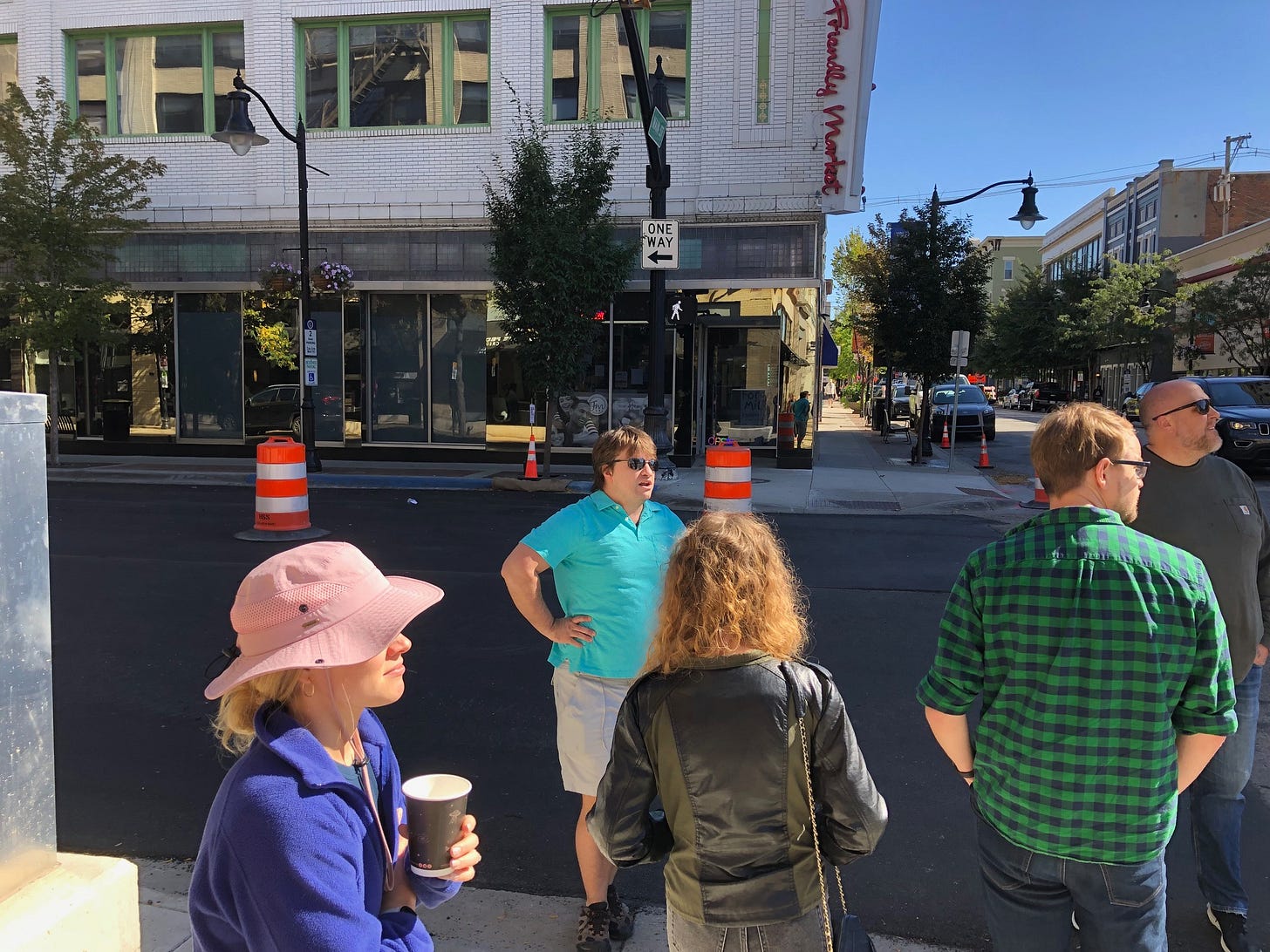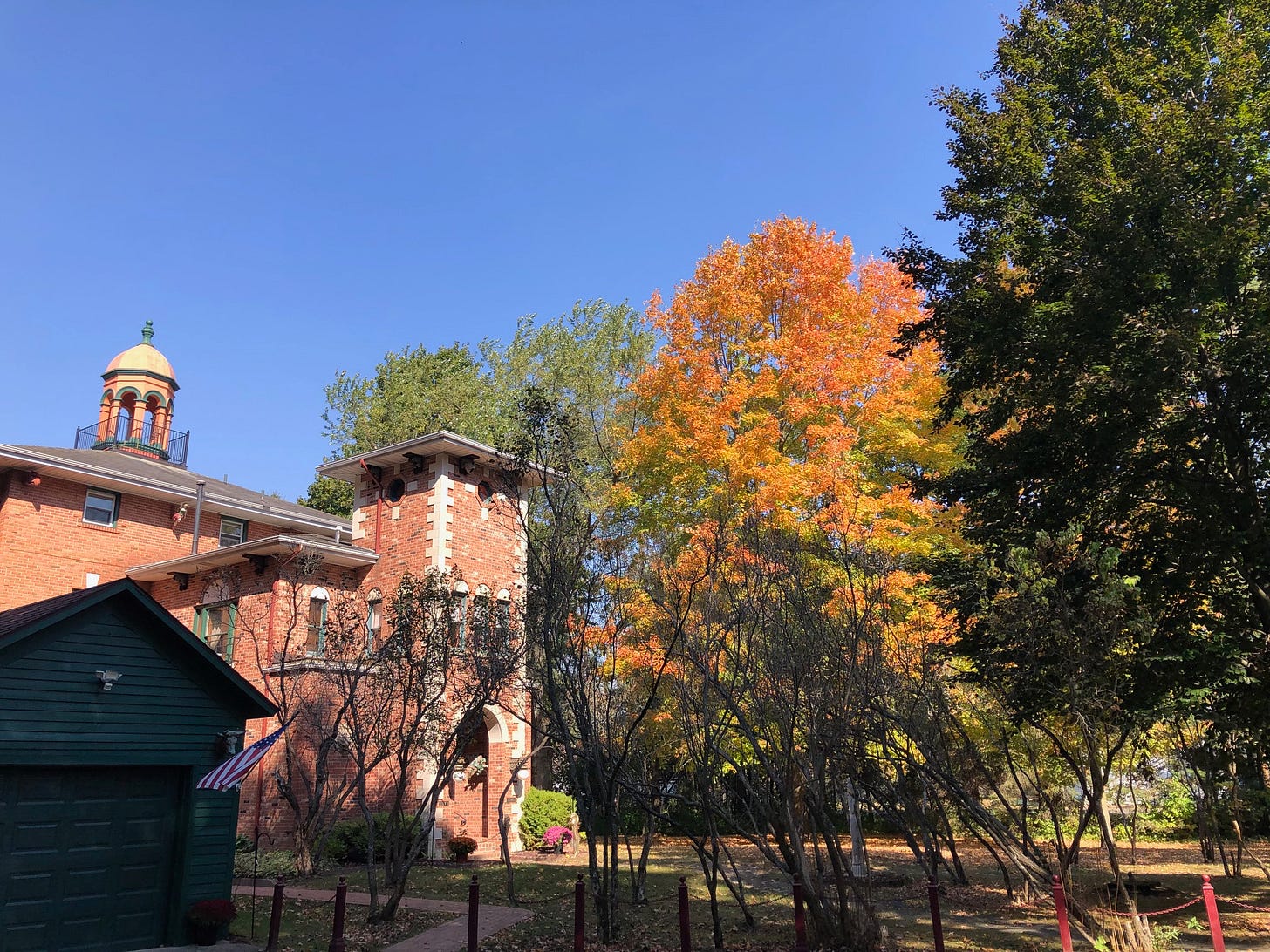Moderates are good, or at least used to be, for avoiding demagoguery and cultural tidal waves. Moderates aren’t so much about compromise as deeper dives. My trip to Michigan last weekend got me thinking about this, and tidal waves, and the French Revolution, and Lafayette, and Purdue, and space programs, and war, and happiness.
If you’ve read here for a while you probably know of Bug Stu and his big story about little aliens called Stralfs that are trying to make us hate Earth and leave in order to start over, leaving the Stralfs to our planet. They use their Bluetooth-speaker-like bodies to talk to us, sometimes playing music, interpreting it, etc.—never for better, only for worse.
I guess the good thing about the Stralfs is that their existence, imaginary or otherwise, can help us see the complexities behind What Makes Is Be in the culture, rather than assigning oversimplified selfish or deluded motivations to each other. Funny, in this way, their very presence, once it’s known, Stu muses, thwarts their own plan. Anyway…
It was around this time five years ago that This Project officially entered its current phase, heavy on “literary” expression and exploration, mostly around the quasi-fictional fantasies of Stu, a mere swamp milkweed leaf beetle from southern England, whom I’d recovered from my memory back in 2016 but didn’t know what to do with exactly. I wanted someone to tell me, exactly, even if they were a little wrong. I mean, this is not really my realm. Five years.
The traditional five-year anniversary gift/theme is wood. Good. That’s probably why some related building restoration projects are finally starting up again this year in Ade Country, an area named after a moderate, George Ade, of another Progressive Era, not that the era saw progress the same way as today.

The question is always, “What is progress?” —not that many people ask it. Some progressive tides make moderates sound like conservatives, and vice versa. Moderates tend to wonder, “Did you think about that or just adopt it out of busyness and bias?” I don’t know that moderates try to be moderates, but there’s something about strategic rhetoric, “progressive” or “conservative,” that surely requires questioning if we really care about being right and not just finding comfort in deciding and aligning.
You might remember the sketch from a couple issues ago, of a feminine hand reaching down to touch another. Sean (pictured above) drew that while I’d stepped away. Everything means something, and some things mean a lot. I decided this meant a lot, which I don’t have time to get into here. But this weekend I met a mom and two of her daughters from a fairly famous family in the realm I was visiting in Michigan, and it made me realize a pattern, maybe even a solution, hidden in the random occurrences of my meeting “the daughters” in this deep and moderate realm I’ve dabbled in for ten years, trying to express it for five, through Stu.
It all started in the fall of 2014 at the Slow Money conference, then continued at subsequent Front Porch Republic conferences. This year it was in Grand Rapids. At the restaurant after the conference, I got to talk to Wendell Berry’s daughter again, Mary. Later I put all this cosmic determinism together, inspired by her dad’s poem which he reads over the trailer for Look and See. I won’t say more about our conversation without her permission, so maybe this weekend, when I’ll fill more of all this out. Here’s the trailer and Wendell’s poem, which will make my poem below have more meaning. You probably already know about the 7th Pie piece. The rest on this will come Sunday.
The Daughters and Three Dots
And there she was…Wendell’s daughter,
right across from me,
just like fall ten years ago,
the conference Slow Money.
We talked about her fathers’ books,
the movie Look and See,
the trailer of all trailers
brings a tear, it’s not just me.
The fathers and their daughters
and the mothers and their sons,
the mix of love’s perspectives,
the determined burdened ones.
And there I was, and there they were
and Mary was the first.
And then Elisabeth, Christopher’s girl,
The Porch, the happily cursed.
They come here for the crowd with ears
to hear the legacy,
their own work in between the lines
of whys and what could be.
Cecilia and Felicia and their mom,
charming Annette,
the father gone for thirty years,
this year we finally met.
Of course, it’s Michigan, again.
Of course, I’d come alone.
Of course, they saw my table.
Of course, my solitude I’d postpone.
I had no reason to suspect
they held a dot that I’d connect
to wrap these daughters’ fathers, three,
in time for Christmas.
Could it be?
Could it be these dots are stars,
a pattern in the sky?
A constellation, clear,
a revelation and a Why?
Could it be…over the rainbow,
also ties down to the ground?
Could it be…we can get home,
through complex patterns some have found?
Are these the dots
that make a piece of pie up in the sky,
and make a Christmas tree
and peace and metaphors that tie…
all these meanings back to home,
abundant presents, presence, known,
the counter to our want to roam,
what others’ wants have clearly sown?
Will a mother sit down with her son,
a father with his girl,
and tell them of what’s just begun,
a new scroll to unfurl,
a story of a story of a story and the wrongs
because we didn’t look at stars
and listen for their songs?
How, instead, we sought the screens
to tell us how things are?
How they bought, and sold
our gaze…to life…as in a jar?
How they put us humans
in the jar then drew a crowd,
to watch each other live, by scripts,
and cry? The din’s so loud.
But there I was, and there they were,
the timing for a time,
when dots all come together,
solving The Century of Crime.
High up on a hill,
not Eldorado, not the gold,
two Star Eyes that complete the tale,
a new tale to take hold.
I saw…how we could now get home.
I saw…the little towns.
I saw…their schemes would not work out.
I saw…our foes’ deep frowns.
Once, I saw how boys and girls
could know which way to go.
Once, and come what may,
I realized who and what’s their foe.
Once upon a time
was an adventure to begin.
Once, up on that hill,
I saw…The Curious would win.

Thanks for reading : ).
Tim



